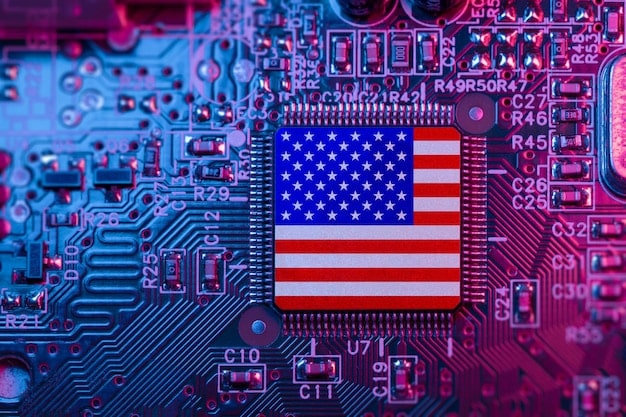AI & US Foreign Policy: Ethical and Security Challenges

US Foreign Policy in the Age of Artificial Intelligence: Navigating the Ethical and Security Challenges involves addressing the complex ethical dilemmas and security threats posed by AI, requiring international cooperation and strategic adaptation to maintain global stability and protect US interests.
The rapidly advancing field of artificial intelligence (AI) is profoundly reshaping various aspects of society, including national security and international relations. This necessitates a critical examination of US Foreign Policy in the Age of Artificial Intelligence: Navigating the Ethical and Security Challenges, as it compels us to rethink traditional strategies and grapple with unprecedented ethical dilemmas.
Understanding the AI Revolution and Its Geopolitical Implications
Artificial intelligence is no longer a concept confined to science fiction; it is a rapidly evolving reality with far-reaching geopolitical implications. Understanding these implications is crucial for shaping effective US foreign policy.
The Transformative Power of AI
AI’s ability to analyze vast amounts of data, automate complex tasks, and make predictions with increasing accuracy is transforming industries and societies worldwide. This transformative power also extends to the realm of international relations, creating new opportunities and challenges for US foreign policy.
The Geopolitical Significance of AI
The nation that leads in AI development and deployment will likely wield significant economic and military advantages. This has spurred intense competition among countries, including the US, China, and Russia, to achieve AI supremacy. This competition raises concerns about potential military applications of AI, such as autonomous weapons systems, and the risk of cyber warfare.

These are some key issues relating understanding and the AI revolution and its geopolitical implications:
- AI’s transformative power is reshaping industries and societies worldwide.
- The geopolitical significance of AI is driving competition among nations for AI supremacy.
- Military applications of AI, such as autonomous weapons systems, raise serious concerns.
In conclusion, the AI revolution presents both opportunities and challenges for US foreign policy. To navigate this complex landscape effectively, the US needs to develop a comprehensive strategy that addresses the ethical, security, and economic implications of AI.
The Ethical Dimensions of AI in US Foreign Policy
The integration of AI into US foreign policy raises profound ethical questions that must be carefully considered. These ethical concerns span a range of issues, from bias and fairness to accountability and transparency.
Bias and Discrimination in AI Systems
AI systems are trained on data, and if that data reflects existing societal biases, the AI system will likely perpetuate those biases. This can have serious consequences for US foreign policy, particularly in areas such as immigration, law enforcement, and counterterrorism.
Accountability and Transparency in AI Decision-Making
As AI systems become more sophisticated, it becomes increasingly difficult to understand how they make decisions. This lack of transparency raises concerns about accountability, particularly when AI systems are used in situations that have significant consequences for individuals or groups.
Key thoughts on accountability and transparency in AI decision-making:
- AI systems can perpetuate societal biases if trained on biased data.
- Lack of transparency in AI decision-making raises concerns about accountability.
- Establish clear ethical guidelines and standards for the development and deployment of AI in foreign policy.
Addressing the ethical dimensions of AI in US foreign policy requires a commitment to fairness, transparency, and accountability. By establishing clear ethical guidelines and standards, the US can ensure that AI is used in a way that aligns with its values and promotes human rights.
Security Threats and Vulnerabilities in the Age of AI
The increasing reliance on AI also introduces new security threats and vulnerabilities that the US must address. These threats range from cyber warfare and disinformation campaigns to the use of AI by adversaries.

Cyber Warfare and AI
AI can be used to develop sophisticated cyber weapons that can target critical infrastructure, steal sensitive information, or disrupt essential services. Defending against these AI-powered cyberattacks requires a new approach to cybersecurity that leverages AI itself.
Disinformation Campaigns and AI
AI can be used to create realistic fake videos and audio recordings, making it easier to spread disinformation and manipulate public opinion. Countering these AI-driven disinformation campaigns requires a combination of technological solutions and media literacy education.
Here is a consideration for security threats and vulnerabilities in the age of AI:
- AI can be used to develop sophisticated cyber weapons.
- AI can generate realistic fake videos and audio recordings to spread disinformation.
- Protecting against AI-related security threats requires a proactive and adaptable approach.
Protecting against these AI-related security threats requires a proactive and adaptable approach. The US must invest in AI research and development, strengthen its cybersecurity defenses, and work with allies to develop international norms and standards for the responsible use of AI.
Strategic Adaptation of US Foreign Policy to AI
To effectively address the challenges and opportunities presented by AI, the US must strategically adapt its foreign policy. This requires a comprehensive approach that integrates AI into all aspects of foreign policy decision-making.
Integrating AI into Diplomatic Efforts
AI can be used to analyze diplomatic communications, identify potential areas of conflict, and even assist in negotiations. By leveraging AI, the US can enhance its diplomatic efforts and promote peaceful resolutions to international disputes.
Using AI for Intelligence Gathering and Analysis
AI can be used to analyze vast amounts of data from various sources, providing valuable insights into the intentions and capabilities of foreign actors. This can help the US to better anticipate threats and make informed decisions about foreign policy.
AI and International Cooperation
International cooperation is crucial for addressing the challenges and opportunities presented by AI. The US should work with allies and partners to develop international norms and standards for the responsible use of AI, promote AI research and development, and address the ethical and security implications of AI.
Examples
- AI can improve diplomatic efforts and promote peaceful resolutions.
- AI can provide valuable insights into the intentions and capabilities of foreign actors.
- International cooperation is crucial for the responsible use of AI.
In conclusion, strategic adaptation of US foreign policy to AI requires a comprehensive approach that integrates AI into all aspects of decision-making. By leveraging AI, the US can enhance its diplomatic efforts, improve its intelligence gathering and analysis capabilities, and promote international cooperation on AI-related issues.
The Role of Public-Private Partnerships in AI Development
The development and deployment of AI require collaboration between the public and private sectors. Public-private partnerships can leverage the expertise and resources of both sectors to accelerate AI innovation and ensure that AI is used in a way that benefits society as a whole.
Incentivizing AI Innovation
The government can incentivize AI innovation by providing funding for research and development, offering tax incentives for companies that invest in AI, and creating regulatory frameworks that encourage innovation while protecting consumers and ensuring fairness.
Sharing Data and Expertise
Public-private partnerships can facilitate the sharing of data and expertise between the public and private sectors. This can help to accelerate AI research and development and ensure that AI systems are trained on diverse and representative datasets.
Some key public-private partnerships in AI development are:
- Incentivizing AI innovation through funding, tax incentives, and regulatory frameworks.
- Sharing data and expertise between the public and private sectors.
- Focusing on workforce development to address the AI skills gap.
Public-private partnerships are essential for fostering AI innovation and ensuring that AI is used in a way that benefits society. By incentivizing innovation, sharing data and expertise, and focusing on workforce development, the US can maintain its leadership in AI and address the challenges and opportunities presented by this transformative technology.
Navigating US Foreign Policy in a World Shaped by AI
The integration of AI into US foreign policy is not without its challenges. Navigating these issues effectively is key to ensuring that the US can maintain its global leadership position and protect its interests.
Addressing the AI Skills Gap
The US faces a shortage of skilled AI professionals. Addressing this skills gap requires investing in education and training programs, attracting talent from abroad, and fostering a culture of lifelong learning. The government needs to work with universities and companies to develop programs that equip individuals with the skills needed to succeed in the age of AI.
Balancing Innovation and Regulation
Striking the right balance between innovation and regulation is crucial for fostering AI development while protecting consumers and ensuring fairness. The government needs to develop regulatory frameworks that are flexible and adaptable, allowing for innovation while addressing potential risks.
Some thoughts when navigating US foreign policy include:
- Address current AI skills gap through better investments in education and training programs.
- Balance innovation and regulation to ensure fairness.
- Working with allies and partners to promote international norms.
In conclusion, navigating US foreign policy in a world shaped by AI will require careful consideration of the ethical, security, and economic implications of this transformative technology. By addressing the AI skills gap, striking the right balance between innovation and regulation, and working with allies and partners, the US can ensure that it is well-positioned to navigate this complex landscape and maintain its global leadership position.
| Key Point | Brief Description |
|---|---|
| 🤖 AI’s Geopolitical Impact | AI supremacy is a new arena for global power competition. |
| 🛡️ Security Vulnerabilities | AI-driven cyber warfare and disinformation pose significant threats. |
| 🤝 International Cooperation | Global coordination is crucial for ethical AI development and deployment. |
| ⚖️ Ethical Considerations | AI bias and accountability demands careful ethical guidelines. |
Frequently Asked Questions
▼
Ethical concerns include biases in AI systems, lack of transparency in decision-making, and the potential for AI to be used in ways that violate human rights. Ensuring fairness and accountability is crucial.
▼
AI can analyze vast amounts of data from various sources, identify patterns, and provide valuable insights into the intentions and capabilities of foreign actors, enhancing situational awareness.
▼
Public-private partnerships incentivize AI innovation, facilitate data and expertise sharing, and help address the AI skills gap, ensuring responsible AI development and deployment.
▼
The US can invest in education and training programs, attract talent from abroad, and foster a culture of lifelong learning to equip individuals with the necessary AI skills for success.
▼
AI-driven cyberattacks, disinformation campaigns, and autonomous weapons systems pose significant security threats. Proactive measures and international cooperation are essential for addressing these risks.
Conclusion
In conclusion, navigating US foreign policy in the age of artificial intelligence requires a multifaceted approach that addresses ethical concerns, security threats, and strategic adaptations. International cooperation, public-private partnerships, and workforce development are crucial for ensuring that AI is used responsibly and effectively to advance US interests and global stability.





